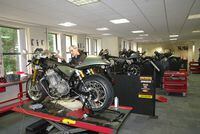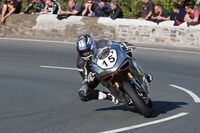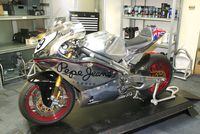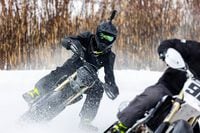Norton Motorcycles owner Stuart Garner, 47, is the man who bet big time on being able to revive Britain's most sporting motorcycle brand as a series production entity – and he now looks set for the bet to pay off. With the purchase of the brand in October 2008 from its previous American owner, Boston financier Olly Curme, Garner obtained the prototype Commando 961 streetbike which Curme had commissioned from the USA's No.1 twin-cylinder Norton guru, Oregon-based Kenny Dreer. During the past eight years since he acquired the rights to the historic British marque, Garner has invested long hours in putting the born-again Norton Motorcycles firmly back on the map, so far building 2,000 motorcycles delivered to customers around the world.
Doing so has entailed shifting from a compact 8,000 square foot factory, housing a dozen employees, to the 45,000 square foot factory at Donington hall estate. The 226-year-old stately home on 26 acres was formerly British Midland International headquarters, housing 500 employees. It was acquired by British Airways in 2012, and in 2014, Garner purchased it from BA. With a major international airport and Grand Prix race track next door, the new Norton facility seems ideal for its 75-person team. Garner is now converting Donington hall into a 14-room boutique hotel and 200-person banqueting facility, alongside the recently acquired Priest House Hotel, a luxury 42-bedroom riverside property – adding a useful revenue stream to help capitalize the flourishing motorcycle business.
Reviving the brand has also involved returning to the Isle of Man the last five years to race in the TT, with new rider David Johnson. Johnson confirmed his status as the TT's fastest Australian, lapping the Isle of Man's 37.75-mile TT Course at over 130mph en route to seventh place in the Superbike TT on the Norton SG5 racebike using a factory-supported version of Aprilia's three-time World Superbike champion RSV4 motor. The reborn Norton Motorcycles company has finally shifted into top gear, and the chance to talk to Stuart Garner in his Donington Hall office explained how and why this has come about.
Motorcyclist: Stuart, eight years on since you first discussed acquiring what remained of the Norton brand, here you are in Donington Hall, with the former BMI reservations centre behind us converted into the Norton assembly line. Is Norton finally re-established for real?
Stuart Garner: It's going really well, but it's not easy. You realise why all those other famous brands that have disappeared didn't make it back to the showroom, because if it was easy everyone would be doing it. But we're moving ahead really well, and we're consistently making 15-20 bikes a week for customers all over the world – it varies a bit from one week to another, but that's the average.
MC: With a global distribution network, and especially strong demand from your latest export market, Australia, are you able to keep up with demand?
SG: Just about. We've added some extra assembly bays – we don't have a production line, because each motorcycle is built by a team of two technicians, plus an apprentice who helps and learns from them. We're up to around 150 people in the building right now, split about 50/50 between full time workers and apprentices. We had a good look at the big picture when we first acquired Norton, and thought it was best for financing the operation, managing risk, and re-establishing the brand with some degree of exclusivity, that we'd take our time and grow slowly. We wouldn't sell equity to other parties, and we wouldn't flood the market with lots of different new models – just concentrate on the same essential 961 Commando platform.
We’ve had loads of things go wrong in the past for Norton since I took it over, and we’ve had lots of criticism for extended delivery times, and not making enough bikes each week, or growing the volumes - but actually, (the slow and steady pace has) turned out to have been the right way after all! We’re still here, still delivering bikes, and one of the advantages of taking our time to stabilize production levels is that we become a safe pair of hands. Running the business with what may seem like an old-fashioned mentality of building volume slowly is perceived as a really safe but pretty boring way for the brand to progress – but that’s fine by me. I’d rather be boring than bust!
MC: I understand you're planning a new volume production 650 twin, as a spinoff from a forthcoming 1200cc Norton V4. What are your plans for these, and when will they reach production?
SG: Well, you might call it a volume product and I suppose it could be in Norton terms, but I don't think the 650 twin will be one by the standards of other brands. Yes, it is indeed on the engineers' drawing board, it's been there for a good few months, and it will once again be a parallel-twin, which in essence is derived from the 1200cc 72º V4 we're also working on, so there will be a reasonable amount of similarity between the two. The 650 will be a liquid cooled, double overhead cam, eight-valve parallel-twin, and its engine will essentially be the V4 with one bank of cylinders chopped off it, so there will be some considerable engineering overlap. For a small business like ours to have two brand new engines in development at the same time is an incredibly big financial commitment for us, and potentially very risky. We've now started what is a very important two-year development window for Norton to get these engines perfected, and powering new models in the marketplace. But they'll be quite different from our existing core product, the pushrod air/oil-cooled Commando which will of course stay in production, and will be unaffected by these two new platforms.
MC: When do you expect to launch the 650?
SG: In fact, we're looking at launching the 1200cc V4 first at the [Birmingham] NEC Show this November, and the 650 there in November 2017. We're a British company making British motorcycles handbuilt here at Donington Hall; why wouldn't we have a British launch instead of running off to Italy and doing it at the EICMA Milan Show? We want to wave the flag and let customers here have a first look at the bikes and place orders for them before marketing them elsewhere. We've not yet determined prices and production volumes for the V4 which is out at the end of this year, so we're still a ways away.
MC: What sort of model do you envisage launching the 650 twin as - will it be a Naked bike?
SG: We’re having some fun with that, and right now we’re thinking it could make a fabulous supercharged sportbike – we’d come in at the top of the market with the high performance version, and then develop various normally aspirated spinoffs from that. We’re going through quite a few scenarios right now, but one that sticks out is a 1970s-style red, white and blue John Player Norton street legal road racer with a modern super lightweight 650cc parallel-twin engine that's supercharged. That could be a real show stopper, and then it could spin off into a Naked streetfighter version….
MC: Would that be non-supercharged, however?
SG: We'll see - we may well offer both versions for production in those models. We may also do a street scrambler 650 twin, and it could even lead to a full dual-purpose on- and off-road model if the market is there for it. As we get closer to launching a prototype, we'll have to take a long, hard look at how the market is moving. Ducati came to market with a lower priced entry point Scrambler, and have done huge volumes with it - but that same market sector might not be open in a year's time. Plus on top of that, they're building all the bikes in Thailand for their largest single market, the USA, so consequently their margins are bigger - but we're not going to build Norton anywhere else but here in the UK. So when we talk about a less expensive Norton 650 twin, it's not going to be Ducati Scrambler money. If the non-supercharged watercooled eight-valve 650 twin were priced comparably to the 961 models today, I think that's fair value for that platform. But I repeat, the 961 Commando isn't going anywhere – that model platform will remain in production practically indefinitely, just being constantly improved.
MC: One of the ways you're promoting the existence of Norton, as well as doing product development, is by racing in the Isle of Man TT for the past four years with an Aprilia RSV4 engine in a Norton chassis. You had a much better result this year, with your new Aussie rider David Johnson aboard. Are you satisfied with the way things went?
SG: We had a great TT this year, and we're now up with the leaders thanks to Davo Johnson's hard work, which we're very grateful to him for. He posted a fastest lap time of 130.87 mph on the Norton, and scored a fabulous 7th place in the Superbike race. It's been a huge step forward for Norton this year, but we're always pushing for more, and have lined up a great starting point for our assault on the 2017 TT, again with Davo riding.
Since the very day we came back from the Isle of Man last year, we’d been investing heavily in developing this year’s bike. There's a new chassis, a new swingarm and a new rear link, but the big thing for 2016 has been a new electronics package on the bike. We’ve been working closely with the Aprilia factory, and have the use of their ECU as developed on their World Superbike championship-winning bike.
MC: So you're saying now that Aprilia is out of World Superbike officially, they've been prepared to work with Norton?
SG: They were always very helpful previously, but now that they have another focus [on MotoGP] they have a little bit more capacity to be even more helpful. We've swapped engineers, and we've had a few Norton people go to the factory in Italy to learn more about the electronics package, and the engine platform in general, and that's been super helpful. The RSV4 motor is super quick, but difficult to calibrate to tame the substantial horsepower it produces. That's bad enough on a billiard table flat short circuit, but it presents a whole new level of difficulty when you're racing on public roads, with all the lumps and bumps in the surface that the Island gives you.
Our test rider is 2009 Senior TT winner Steve Plater, so he knows what he's doing. Steve’s been helping refine the Norton package, but we were using the Cosworth software from last year, and couldn’t get the correct throttle calibration to make the engine calm enough for the guys to be able to use it properly on the TT Course. The bike was too reactive, too aggressive, so we had a discussion with Aprilia, and learned they had similar issues on their own Superbikes with this same engine. That’s been a big issue that we’ve now cracked with Aprilia’s help, and Davo’s great performance on this year’s Norton has underlined that.
MC: Presumably the acquired knowledge that you've achieved in liaising with Aprilia on the TT racer is going to help with producing the forthcoming Norton V4 road bikes?
SG: 100% correct. The only way to justify the budget we spend going racing in the Island is that it's helping us develop the 1200cc V4 road bike that's morphing out of the Norton TT racer.
MC: Norton doing well in the Isle of Man TT is a very significant step forward in bringing the brand back to the global stage. It's been eight years since you first began negotiating to acquire Norton - are you where you hoped you'd be?
SG: I think we're behind in some ways, and ahead in others. We're behind where we thought we'd be in volume, but we're miles ahead in strength of the brand, and establishing such a great infrastructure here at Donington Hall. If seven and a half years ago you'd offered me the chance for Norton to be where it is today, I'd have grabbed it with both hands. We have not arrived where we wanted to be in quite the same manner, but the net result is that the Norton brand is very much back in business in a very strong, healthy way.















/cloudfront-us-east-1.images.arcpublishing.com/octane/VZZXJQ6U3FESFPZCBVXKFSUG4A.jpg)
/cloudfront-us-east-1.images.arcpublishing.com/octane/QCZEPHQAMRHZPLHTDJBIJVWL3M.jpg)
/cloudfront-us-east-1.images.arcpublishing.com/octane/HXOUJXQWA5HBHGRO3EMJIGFMVI.jpg)

/cloudfront-us-east-1.images.arcpublishing.com/octane/3TIWWRV4JBBOLDVGRYECVVTA7Y.jpg)
/cloudfront-us-east-1.images.arcpublishing.com/octane/KIX5O23D5NAIBGFXBN3327DKZU.jpg)
/cloudfront-us-east-1.images.arcpublishing.com/octane/7GJYDUIPXRGMTMQKN6ONYOLBOU.jpg)
/cloudfront-us-east-1.images.arcpublishing.com/octane/MUQLOVLL2ZDGFH25ILABNBXKTI.jpg)
/cloudfront-us-east-1.images.arcpublishing.com/octane/TNOU5DNE2BC57MFPMGN2EIDXAM.jpg)
/cloudfront-us-east-1.images.arcpublishing.com/octane/GTCXACQGJ5HAPDTGWUQKDEH44E.jpg)
/cloudfront-us-east-1.images.arcpublishing.com/octane/S35YGSEMEZB4BLTDJTSZPF4GLA.jpg)
/cloudfront-us-east-1.images.arcpublishing.com/octane/5UOT6HPX2JFMRJAX6EH45AR4MQ.jpg)
/cloudfront-us-east-1.images.arcpublishing.com/octane/OKWOJWAKP5EP3OACCRRWPCIX2Q.jpg)
/cloudfront-us-east-1.images.arcpublishing.com/octane/2WF3SCE3NFBQXLDNJM7KMXA45E.jpg)
/cloudfront-us-east-1.images.arcpublishing.com/octane/G4MG6OUCJNBSHIS2MVVOTPX65E.jpg)
/cloudfront-us-east-1.images.arcpublishing.com/octane/IIGGWFOTOJGB7DB6DGBXCCMTDY.jpg)
/cloudfront-us-east-1.images.arcpublishing.com/octane/QSTCM6AVEZA5JJBUXNIQ3DSOF4.jpg)
/cloudfront-us-east-1.images.arcpublishing.com/octane/U4I7G625B5DMLF2DVIJDFZVV6M.jpg)
/cloudfront-us-east-1.images.arcpublishing.com/octane/B6XD6LS6IVCQPIU6HXDJSM3FHY.jpg)
/cloudfront-us-east-1.images.arcpublishing.com/octane/ICL63FEDDRDTTMINYICCEYGMDA.jpg)
/cloudfront-us-east-1.images.arcpublishing.com/octane/FCGZHQXRBZFLBAPC5SDIQLVF4I.jpg)
/cloudfront-us-east-1.images.arcpublishing.com/octane/WNOB6LDOIFFHJKPSVIWDYUGOPM.jpg)

/cloudfront-us-east-1.images.arcpublishing.com/octane/X33NU3E525ECRHXLNUJN2FTRKI.jpg)